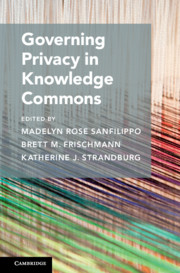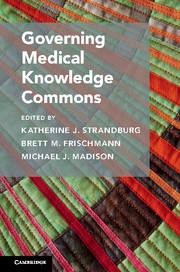27 results

Governing Privacy in Knowledge Commons
-
- Published online:
- 29 March 2021
- Print publication:
- 25 March 2021
-
- Book
-
- You have access
- Open access
- Export citation
Part I - Personal Information as a Knowledge Commons Resource
-
- Book:
- Governing Privacy in Knowledge Commons
- Published online:
- 29 March 2021
- Print publication:
- 25 March 2021, pp 51-148
-
- Chapter
-
- You have access
- Open access
- HTML
- Export citation
5 - Public Facebook Groups for Political Activism
- from Part I - Personal Information as a Knowledge Commons Resource
-
-
- Book:
- Governing Privacy in Knowledge Commons
- Published online:
- 29 March 2021
- Print publication:
- 25 March 2021, pp 121-148
-
- Chapter
-
- You have access
- Open access
- HTML
- Export citation
Part III - Bringing Information Subjects into Commons Governance
-
- Book:
- Governing Privacy in Knowledge Commons
- Published online:
- 29 March 2021
- Print publication:
- 25 March 2021, pp 201-202
-
- Chapter
-
- You have access
- Open access
- HTML
- Export citation
Tables
-
- Book:
- Governing Privacy in Knowledge Commons
- Published online:
- 29 March 2021
- Print publication:
- 25 March 2021, pp viii-viii
-
- Chapter
-
- You have access
- Open access
- HTML
- Export citation
Part II - Privacy as Governance of Participation and Boundaries
-
- Book:
- Governing Privacy in Knowledge Commons
- Published online:
- 29 March 2021
- Print publication:
- 25 March 2021, pp 149-200
-
- Chapter
-
- You have access
- Open access
- HTML
- Export citation
Copyright page
-
- Book:
- Governing Privacy in Knowledge Commons
- Published online:
- 29 March 2021
- Print publication:
- 25 March 2021, pp iv-iv
-
- Chapter
-
- You have access
- Open access
- HTML
- Export citation
Conclusion - Privacy as Knowledge Commons Governance
- from Part III - Bringing Information Subjects into Commons Governance
-
-
- Book:
- Governing Privacy in Knowledge Commons
- Published online:
- 29 March 2021
- Print publication:
- 25 March 2021, pp 268-290
-
- Chapter
-
- You have access
- Open access
- HTML
- Export citation
Contents
-
- Book:
- Governing Privacy in Knowledge Commons
- Published online:
- 29 March 2021
- Print publication:
- 25 March 2021, pp v-vi
-
- Chapter
-
- You have access
- Open access
- HTML
- Export citation
Introduction
-
-
- Book:
- Governing Privacy in Knowledge Commons
- Published online:
- 29 March 2021
- Print publication:
- 25 March 2021, pp 1-4
-
- Chapter
-
- You have access
- Open access
- HTML
- Export citation
Acknowledgments
-
- Book:
- Governing Privacy in Knowledge Commons
- Published online:
- 29 March 2021
- Print publication:
- 25 March 2021, pp xi-xii
-
- Chapter
-
- You have access
- Open access
- HTML
- Export citation
Contributors
-
- Book:
- Governing Privacy in Knowledge Commons
- Published online:
- 29 March 2021
- Print publication:
- 25 March 2021, pp ix-x
-
- Chapter
-
- You have access
- Open access
- HTML
- Export citation
Figures
-
- Book:
- Governing Privacy in Knowledge Commons
- Published online:
- 29 March 2021
- Print publication:
- 25 March 2021, pp vii-vii
-
- Chapter
-
- You have access
- Open access
- HTML
- Export citation
1 - Privacy and Knowledge Commons
-
-
- Book:
- Governing Privacy in Knowledge Commons
- Published online:
- 29 March 2021
- Print publication:
- 25 March 2021, pp 5-50
-
- Chapter
-
- You have access
- Open access
- HTML
- Export citation

Governing Medical Knowledge Commons
-
- Published online:
- 12 October 2017
- Print publication:
- 12 October 2017
-
- Book
-
- You have access
- Open access
- Export citation
15 - The North American Mitochondrial Disease Consortium: A Developing Knowledge Commons
-
-
- Book:
- Governing Medical Knowledge Commons
- Published online:
- 12 October 2017
- Print publication:
- 12 October 2017, pp 348-389
-
- Chapter
-
- You have access
- Open access
- HTML
- Export citation
1 - The Knowledge Commons Framework
-
-
- Book:
- Governing Medical Knowledge Commons
- Published online:
- 12 October 2017
- Print publication:
- 12 October 2017, pp 9-18
-
- Chapter
-
- You have access
- Open access
- HTML
- Export citation
Copyright page
-
- Book:
- Governing Medical Knowledge Commons
- Published online:
- 12 October 2017
- Print publication:
- 12 October 2017, pp iv-iv
-
- Chapter
-
- You have access
- Open access
- HTML
- Export citation
Knowledge Commons and the Road to Medical Commons
-
-
- Book:
- Governing Medical Knowledge Commons
- Published online:
- 12 October 2017
- Print publication:
- 12 October 2017, pp 1-8
-
- Chapter
-
- You have access
- Open access
- HTML
- Export citation
Appendix: Methods for Mouse Patent Landscape and Impact Analysis
- from 10 - Governance of Biomedical Research Commons to Advance Clinical Translation: Lessons from the Mouse Model Community
-
- Book:
- Governing Medical Knowledge Commons
- Published online:
- 12 October 2017
- Print publication:
- 12 October 2017, pp 249-258
-
- Chapter
-
- You have access
- Open access
- HTML
- Export citation



